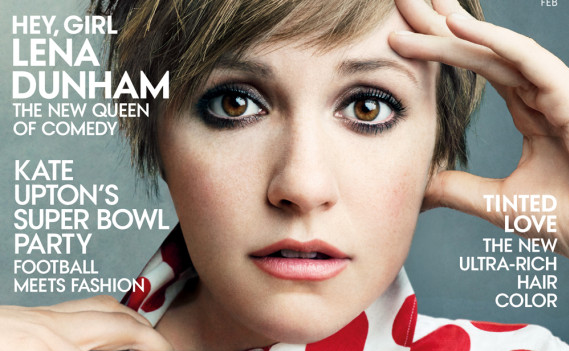Women’s magazines and blogs are blasting the popular feminist website Jezebel for a surprising reason—photoshop. Jezebel, which is famously known for condemning publications overuse of the editing software, is now on the receiving end of this criticism after assuming Vogue used too much Photoshop on February’s cover girl, Lena Dunham, and offering $10,000 to anyone who turned in untouched photos of the layout.
At first glance Vogue’s latest cover seemed unsuspecting – a close-up shot of Dunham’s face making a Twiggy-esque expression. The rest of the spread is nothing out of the ordinary compared to many Vogue spreads. Lena is wearing avant-garde, high-end designs with city landscapes and apartment room backdrops. However, Jezebel believed that Vogue, who has gone too far with editing photos in the past, had done it again. “This is about Vogue, and what Vogue decides to do with a specific woman who has very publicly stated that she’s fine just the way she is, and the world needs to get on board with that,” wrote Jezebel’s editor-in-chief, Jessica Coen. “Just how resistant is Vogue to that idea? Unaltered images will tell.”
Readers immediately responded to the post leaving comments on the article and taking to social media. The overall reaction was that Jezebel was ignoring the fact that Vogue was finally putting a person on the cover who did not fit the stereotypical slender physique usually seen in the magazine. In addition, many felt that altered images are a given for high-end photo shoots that generally have a fantasy aura. Many articles labeled the money offer from Jezebel as a “bounty,” as seen on a post on Huffington Post Women titled “Why Jezebel’s ‘Bounty’ For Unretouched Lena Dunham Images Is Seriously Misguided.” Less than 24 hours after Jezebel’s request, the blog received the images and revealed to the world how much Photoshop was used on Dunham—which wasn’t a lot. The drastic differences were really how the backgrounds were altered, which is not very surprising since acclaimed photographer, Anna Leibovitz, took the photos and she is known for morphing images and backdrops together. Jezebel published the photos as GIFs showing the before and after. There were some alterations to Dunham, like darkening an eyebrow and shaving down the back of her neck. However, none of the edits changed Dunham’s overall appearance to make her look like a different person. Vogue portrayed the Lena Dunham fans know.
Dunham did not appreciate the outcry. She told Slate France, “I know that I felt really like Vogue supported me and wanted to put a depiction of me on the cover. I never felt bullied into anything; I felt really happy because they dressed me and styled me in a way that really reflects who I am […] I don’t understand why, Photoshop or not, having a woman who is different than the typical Vogue cover girl, could be a bad thing.” She added, “A fashion magazine is like a beautiful fantasy. Vogue isn’t the place that we go to look at realistic women. […] If they want to see what I really look like go watch the show that I make every single week.”
Jezebel’s aim to shame Vogue has opened a new dialogue about Photoshop. Cosmopolitan tweeted and posted a survey asking their readers what their opinions were on the matter. Questions included how much it bothered readers when certain body parts are retouched, how often they believe magazines use Photoshop and asked if readers would want to be retouched if they were on a magazine cover, which 63 percent of readers responded they would.
On the heels of this discussion, Aerie announced their new campaign #aerieReal, which will only use unaltered images in its ads. This has gained a lot of support from customers and the media and could be a sign of what is to come for magazines and the fashion industry in the future. Although Jezebel did not intend to receive so much criticism for calling attention to Vogue’s use of Photoshop, it has opened the doors to a conversation about the practice, how it is used, and how it affects people’s perceptions of body image.








































































































